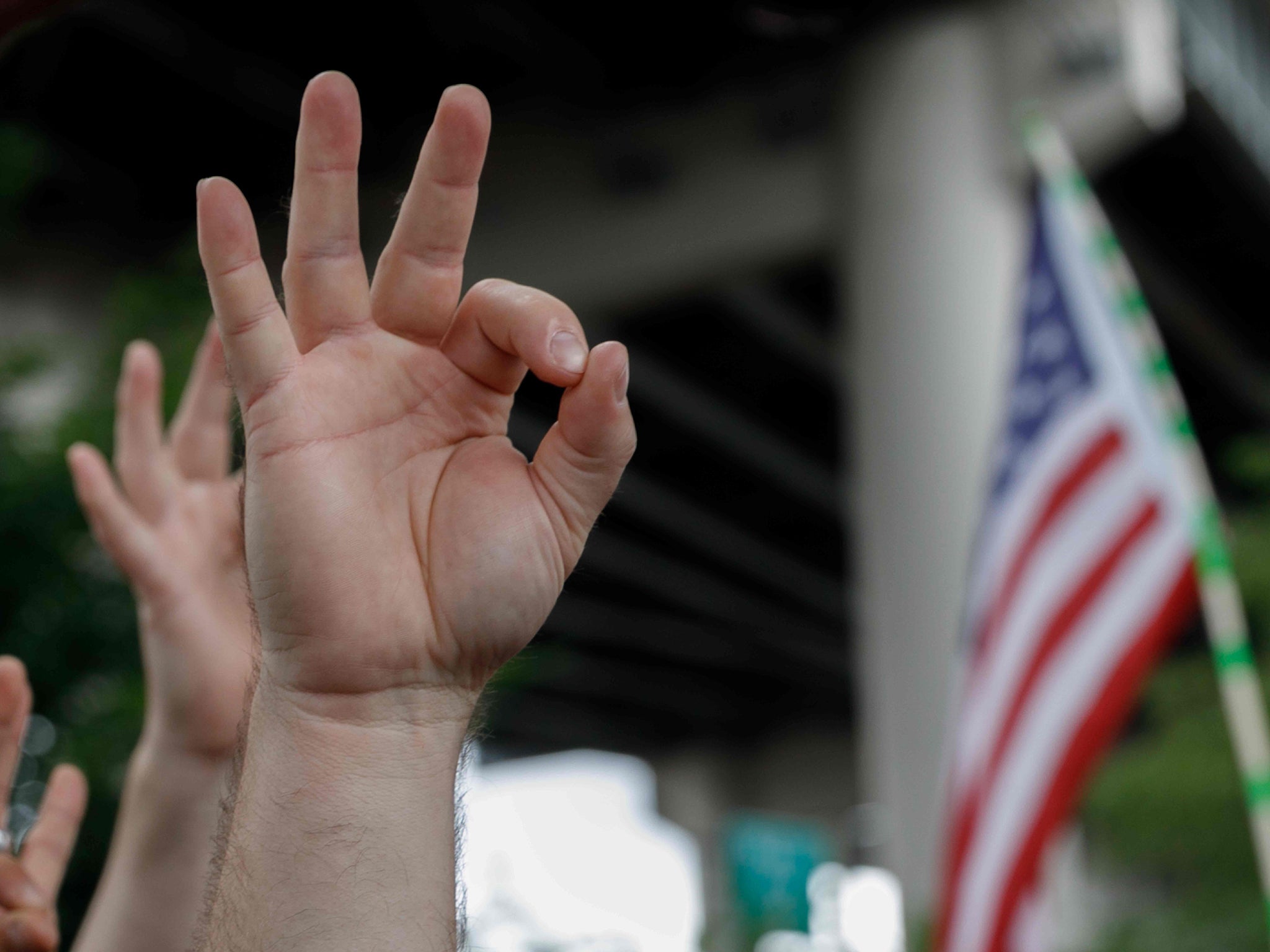Far-right extremists using euphemisms to spread mainstream violent and racist ideas, report warns
Seemingly innocuous words and symbols are used ‘to make radical-right ideas more palatable to a wider public’, Lizzie Dearden reports

Far-right extremists are using euphemisms to spread their racist and violent ideas while evading online crackdowns, experts have warned.
A report seen exclusively by The Independent details the memes, symbols and slogans that neo-Nazis and white supremacists use to communicate with each other and “mainstream” their aims.
But it warns that the “quick-moving” shifts between different codes makes it difficult for social media companies to identify their true meaning and remove hateful accounts.
A cartoon frog, “ok” hand sign, numbers and Celtic runes are among the seemingly harmless symbols adopted by online networks.
“The extreme right continue to exist in the UK, campaigning for a white society and inciting violence against their opponents,” said John E Richardson, of the Centre for Analysis of the Radical Right (CARR).
“However because these aims are offensive – and often illegal – they communicate using words, phrases and images that many people wouldn’t initially associate with their politics.
“In order to understand their politics we need to understand how they communicate – we need to be aware of the kinds of ideas, stories and images that they share, and what these mean, so we can oppose them when we see it.”
The research, which was supported by Facebook, warned of the use of euphemisms that “are used to make radical-right ideas more palatable to a wider public”.
They include using “Zionists” or “globalists” to refer to Jews, the description of Holocaust deniers as “historical revisionists” and the term the “great replacement”.
The report refers to an alternative version of the white genocide conspiracy theory, whose adherents believe that white people are being eradicated by non-whites either as part of a deliberate plot or due to migration and birth rates.
“The Great Replacement” was the title of a manifesto posted online by the Christchurch shooter, Brenton Tarrant, before he massacred 51 victims at mosques in New Zealand last year.
The phrase was also mentioned in the online screed by Patrick Crusius, who killed 22 people in El Paso, Texas, and has inspired several other terror attacks and plots.
The Europe-wide Generation Identity group is a major promoter of the “great replacement” theory and uses a series of euphemisms in its communications.
The UK branch described itself as representing “native Europeans”, rather than white people, and claimed to champion their “cultural heritage” as part of a “patriotic youth movement”.
Generation Identity proposed to “preserve our peoples’ ethnocultural identity” through the “repatriation of anyone who has entered our countries illegally” – meaning the expulsion of refugees and irregular migrants.

Most of the group’s leaders and national factions have been able to remain on mainstream social media platforms because of their careful use of language, which means they do not violate the terms and conditions.
Dr Richardson said far-right extremists had also “cannibalised rights-based discourse” in order to present their ideas as progressive, and label takedowns as infringements of freedom of speech.
In 2017, users of the 4chan imageboard started a campaign to spread posters carrying the slogan “it’s okay to be white” in order to provoke a divisive reaction.
But the phrase was then picked up by white supremacist groups in recruitment campaigns in the UK and around the world.
Dr Matthias Wasser, who co-authored the report, said there had been a rise in phrases and symbols with “dual or legitimate meanings” that make a poster’s true intentions hard to prove.
“There has been an adoption of things that are almost impossible to strictly categorise as white supremacist, and in some cases are deliberately chosen to make the censoring or offended person look ridiculous for coming down on it,” he told The Independent.
He cited another example as the “OK” hand signal, which also started in 2017 as a 4chan hoax named “Operation O-KKK”.
Proponents claimed to be tricking liberals and the mainstream media into believing that the innocuous gesture was actually a clandestine symbol of white power.
But it ceased to be a hoax when neo-Nazis and Ku Klux Klansmen began using the gesture in public, and started interpreting it as forming the letters W and P, for “white power”.

Dr Wasser said the symbol has proved useful to white nationalists because “it was common enough for someone to use the emoji or gesture for completely innocent reasons”.
The report also warned of the “memeification” of hatred, where often comedic images and cartoons are used to spread or signify extremist ideas.
The best-known meme may be Pepe the Frog – a cartoon that first appeared in a 2005 comic but was adapted to become a racist symbol.
During Donald Trump’s election campaign, Pepe memes were co-opted by the American “alt-right” and became popular with far-right extremists around the world.
“From Trump’s election campaign onwards, Pepe has been used to represent a variety of extremist political ideologies, from white supremacism to neo-Nazism,” the report said, adding that Pepe has now been largely replaced with another cartoon amphibian called Groyper.
Dr Wasser said improved “ideological literacy” was needed for social media companies to navigate the symbols and codes used by far-right extremists.
He raised concern that the coronavirus pandemic could drive support for “nationalist and xenophobic states” globally, adding: “I fear a global recession is going to trigger an advance of radical right politics into the mainstream.”
Facebook said it had commissioned the research “to better understand and respond to the changing nature of violent extremism online”.
“We work to disrupt and keep organised hate off our services,” a spokesperson added.
Join our commenting forum
Join thought-provoking conversations, follow other Independent readers and see their replies
Comments